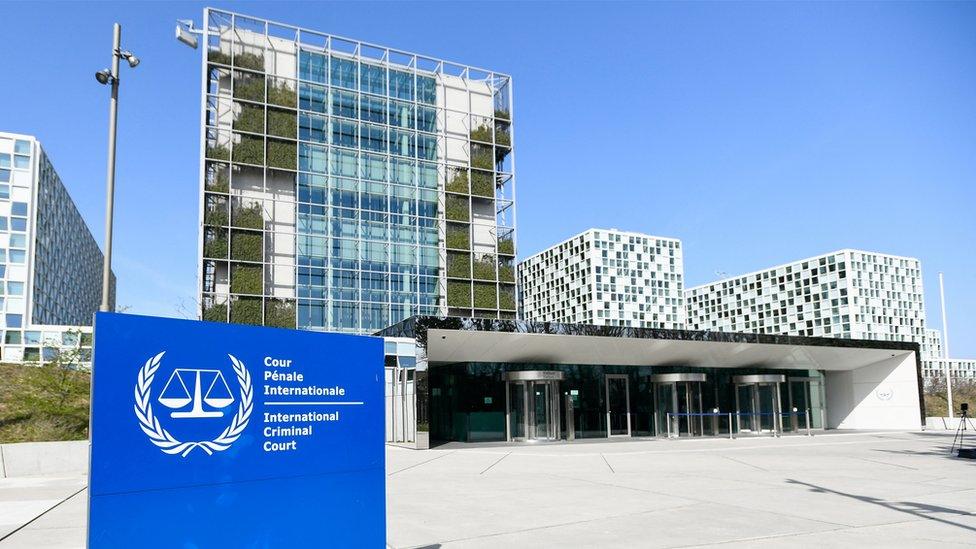Kenyatta appears at ICC in Hague for landmark hearing
- Published
A large crowd was waiting for Uhuru Kenyatta outside the court, as Anna Holligan reports
Kenyan President Uhuru Kenyatta has appeared before the International Criminal Court (ICC), where he faces charges of crimes against humanity.
He is the first serving head of state to come before the court in The Hague.
He was called to appear at the ICC "status conference" when the prosecution said evidence needed to go ahead with a trial was being withheld.
The charges - which Mr Kenyatta denies - concern his alleged role in violence following the 2007 elections.
More than 1,000 people died in the aftermath of the poll.
Mr Kenyatta says the charges against him are politically motivated and insists that the case should be thrown out.
The prosecution accuses the Kenyan government of obstructing the investigation.

At the scene: Anna Holligan, BBC News, The Hague
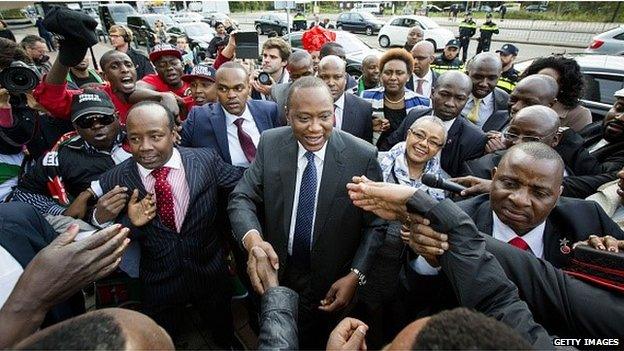
Uhuru Kenyatta (C) shakes hands with supporters outside the International Criminal Court
The president temporarily relinquished power to come to The Hague. Nevertheless, his convoy received a presidential welcome. Flag-waving crowds surged as his police-escorted car pulled up. International TV crews jostled to get him in their frame.
But the trial has reached a deadlock. The prosecution accuse the Kenyan government of withholding vital evidence, the defence say without evidence there should be no trial. Around 100 politicians flew to The Hague. One of them told me they had all paid their own air fares, a public demonstration of support for their president.
About 1,200 Kenyans were killed in the violence - the case was sent to the ICC after Kenya failed to bring the perpetrators to justice. The judges must now decide whether to abandon the trial or give the prosecution more time to search for the missing evidence.

The ICC wants Mr Kenyatta to explain allegations that evidence against him had been withheld by the Kenyan government - a claim rejected by Kenyan Attorney-General Githu Muigai, who appeared before the court on Tuesday.
Scores of Mr Kenyatta's supporters packed the public gallery as the hearing got under way.
Defence lawyer Steven Kay said Mr Kenyatta would not be making a statement. He said the government had co-operated with the prosecution requests where it was possible to do so.
The hearing was later adjourned.
As he left the court Mr Kenyatta told his supporters in Swahili: "We know where we are coming from, we know where we are now, we know where we are going. No-one will tell us where we are going and yes, we will decide for ourselves."
The prosecution has accused the Kenyan government of failing to hand over potentially crucial pieces of evidence
ICC chief prosecutor Fatou Bensouda, who is from The Gambia, said there was still a significant "body of evidence" against Mr Kenyatta.
The prosecution, which wants an indefinite adjournment, told the court it had phone data and nine witnesses who were willing to testify how Mr Kenyatta had funding links with the Mungiki sect which took part in the violence.
Fergal Gaynor, a lawyer for the victims, said they were entitled to know why witnesses for the prosecution had withdrawn from the case.
In September, the court postponed the trial after prosecutors said the Kenyan government had failed to deliver key documents.
Personal capacity
Deputy President William Ruto is acting president while Mr Kenyatta is at The Hague.
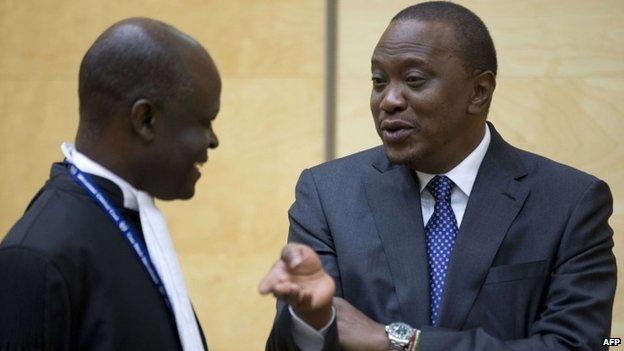
Mr Kenyatta (R) shown here with a member of his defence team has appeared relaxed throughout the trial
On Monday, the president again stressed his innocence, saying his conscience was clear.
In a speech to the Kenyan parliament, Mr Kenyatta said that he was going to The Hague in a personal capacity - not as president of the country - so as not to compromise the sovereignty of Kenyans.
No special arrangements have been made at the ICC. The main spokesperson for the court said that Mr Kenyatta would not be treated differently from any other accused person.
What is the ICC and how does it work?
Mr Kenyatta was elected in 2013, despite facing charges. Analysts said he turned the prosecution to his advantage, portraying it as foreign intervention in Kenya's domestic affairs.
Mr Kenyatta has accused the court of being biased against African leaders.
In 2009 the ICC also issued a warrant for Sudanese President Omar al-Bashir over alleged war crimes in Darfur, but he has not yet been arrested.
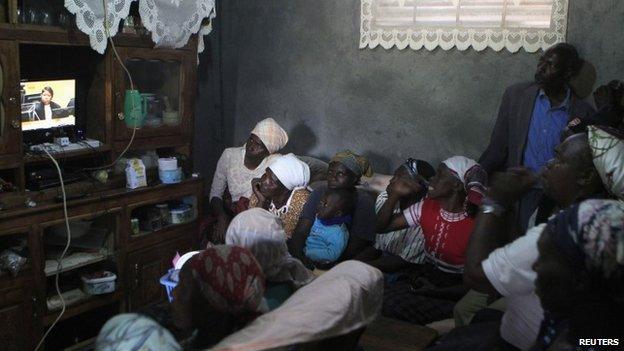
Those displaced by the wave of violence following the 2007 Kenyan elections, watch Uhuru Kenyatta's hearing
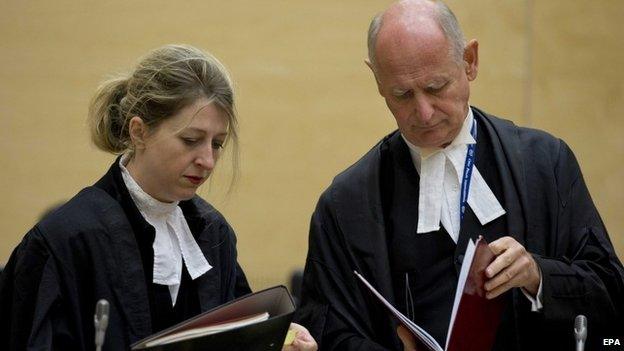
Uhuru Kenyatta's defence lawyers, Gillian Higgins and Steven Kay, pore over legal documents
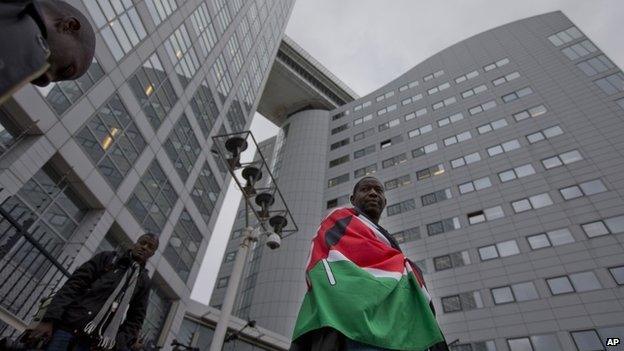
One of Uhuru Kenyatta's many supporters waits for him outside the International Criminal Court
Mr Kenyatta faces five charges relating to the ethnic massacres - the worst violence in Kenya since independence in 1963. Tens of thousands of people were displaced and Kenya's reputation for stability was tarnished.
Mr Kenyatta was a close ally of President Mwai Kibaki, who was declared the winner of the 2007 election. Mr Kibaki's rival, Raila Odinga, claimed the poll was marred by fraud.
The dispute took on an ethnic dimension, pitting members of the Kikuyu ethnic group of Mr Kenyatta and Mr Kibaki against other communities such as the Luo and Kalenjin. Mr Kenyatta is accused of organising an ethnic Kikuyu gang, the Mungiki sect, to attack rival groups.
Deputy President Ruto also faces charges at The Hague, but he was on Mr Odinga's side during the violence. He also denies the charges.
- Published8 October 2014
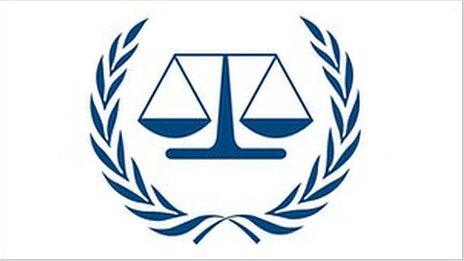
- Published10 September 2013
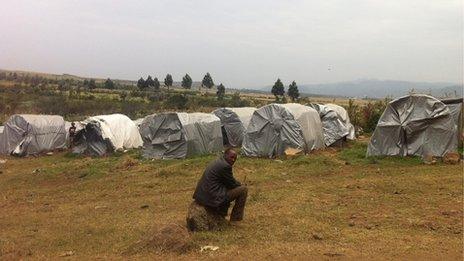
- Published5 December 2014
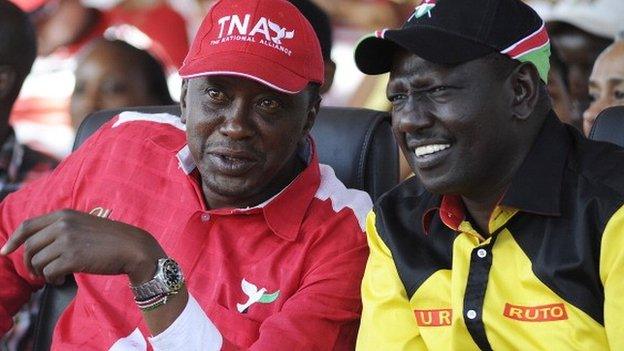
- Published11 October 2013
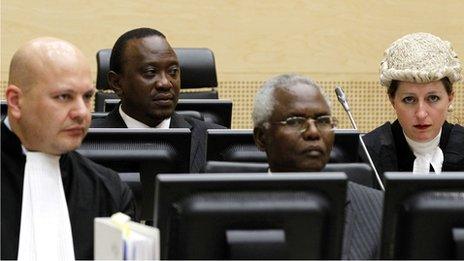
- Published7 February
